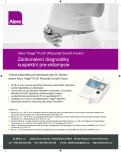Effect of resilience in women on the outcome of her first IVF/ICSI
Authors:
Gabriela Ďurašková 1
; Radek Hampl 2; J. Štěpán 2; M. Kupka 1
Authors‘ workplace:
Katedra psychologie, Filozofická fakulta UP, Olomouc, vedoucí katedry PhDr. M. Šucha, Ph. D.
1; Centrum asistované reprodukce Sanus, Pardubice, vedoucí lékařka MUDr. Š. Novotná
2
Published in:
Ceska Gynekol 2014; 79(2): 115-119
Overview
Objective:
To examine whether women´s well-being and coping strategies are associated with IVF outcomes.
Design:
Prospective study.
Setting:
Centre of assisted reproduction Sanus, Pardubice; PPCHC s.r.o. Hradec Králové
Methods:
Study included these methods of data collection; Psychological well-being was mesured by Dotazník životní spokojenosti (Questionnaire of well-being,n = 103) and coping strategies were mesured by COPE Invetory (n = 82). In the years 2010–2013 women attending their first cycle IVF/ICSI (younger than 35 years) were asked to fill in the psychological questionnaires prior to collection of oocytes. Then the result of IVF/ICSI was observed – a clinically recognized pregnancy. We compared general well-being, satisfaction with their own health, marital satisfaction and emotion focused coping strategies: Acceptance, Positive reinterpretation and Seeking of emotional social support, between pregnant and non-pregnant women.
Results:
There were no statistically significant differences between women who became pregnant and those who did not in general well-being (t = -0.9,p = 0.37), satisfaction with their own health (t = -0.6, p = 0.52), marital satisfaction (t = -0.8, p = 0.44), use of Acceptance (t = 0.9 , p = 0.36) and Positive reinterpretation (t = -0.8, p = 0.43). The only factor that was significantly associated with pregnancy outcome was Seeking of emotional social support (t = 2.3, p = 0.02).
Conclusion:
We found no evidence that psychological well-being had any influence on the outcome of IVF/ICSI treatment. In case of emotion focused coping we found that women who became pregnant used significantly more often strategy called Seeking of emotional social support than women who remained nonpregnant.
Keywords:
well-being, coping, resilience, assisted reproduction, IVF/ICSI
Sources
1. Anderheim, L., Holter, H., Bergh, C., Moller, A. Does psychological stress affect the outcome of in vitro fertilization? Hum Reprod, 2005, 20, 10, p. 2969–2975.
2. Baumgartner, F. Zvládání stresu – coping. In Výrost, J., Slaměník, I. (Eds.) Aplikovaná sociální psychologie II. Praha: Grada, 2001, s. 191–208.
3. Boivin, J., Schmidt, L. Infertility related stress in men and woman predicts treatment outcome 1 year later. Fertil Steril, 2005, 83, 6, p. 1745–1752.
4. Carver, CS., Scheier, MF., Weintraub, JK. Assessing coping strategies: A theoretically based approach. J Pers Soc Psychol, 1989, 56, p. 267–283.
5. De Liz, TM, Strauss, B. Differential efficacy of group and individual/couple psychotherapy with infertile patients. Hum Reprod, 2005, 20, p. 1324–1332.
6. Demyttenaere, K., Bonte, L., Gehldof, M., et al. Coping style and depression level influence outcome in in vitro fertilization. Fertil Steril, 1998, 69, p. 1026–1033.
7. Domar, AD., Clapp, D., Slawsby, EA., et al. Impact of group psychological interventions on pregnancy rates in infertile women. Fertil Steril, 2000, 73, p. 805–811.
8. Fahrenberg, J., Myrtek, M., Schumacher, J., Brahler, E. Dotazník životní spokojenosti. Praha: Testcentrum, 2001, s. 85.
9. Folkman, S., Lazarus, RS. An analysis of coping in a middleaged community sample. J Health Soc Behav, 1980, 21, p. 219–239.
10. Hermann, D., Scherg, H., Verres, R., et al. Resilience in infertile couples acts as a protective factor against infertility-specific distress and impaired quality of life. J Assist Reprod Genet, 2011, 28, p. 1111–1117.
11. Konečná, H. Na cestě za dítětem. Dvě malá křídla. Praha: Galén, 2009, s. 269.
12. Lintsen, AME., Verhaak, CM., Eijkemans, MJC., et al. Anxiety and depression have no influence on the cancellation and pregnancy rates of a first IVF or ICSI treatment. Hum Rep, 2009, 24, 5, p. 1092–1098.
13. Matthiesen, SMS, Frederiksen, Y., Ingerslev, HJ., Zacha-riae, R. Stress, distress and outcome of assisted reproductive technology (ART): a meta-analysis. Hum Rep, 2011, 26, 10, p. 2763–2776.
14. Panagopoulou, E., Vedhara, K., Gaintarzti, C., Tarlatzis, B. Emotionally expressive coping reduces pregnancy rates in patients undergoing in vitro fertilization. Fertil Steril, 2006, 86, 3, p. 672–677.
15. Paulík, K. Psychologie lidské odolnosti. Praha: Grada, 2010, s. 240.
16. Rapoport-Hubschman, N., Gidron, Y, Reicher-Atir, R., et al. „Leting go“ coping is associated with successful IVF treatment outcome. Fertil Steril, 2009, 92, 4, p. 1384–1387.
17. Ridenour, A., Yorgason, J., Peterson, B. The infertility resilience model: assessing individual, couple, and external predictive factors. Contemp Fam Ther, 2009, 31, p. 34–51.
18. Slade, P., Emery, J., Lieberman, BA. A prospective, longitudinal study of emotions and relationships in in vitro fertilization treatment. Hum Reprod, 1997, 12, p. 183–190.
19. Sobotková, I. Psychologie rodiny. Praha: Portál, 2012, s. 219.
20. Strnadová, V. Způsoby zvládání stresu (copingové strategie). In Řehulka, E., Řehulková, O. (Eds.). Učitelé a zdraví 3. Brno: P. Křepela, 2001, s. 95–113.
21. Terry, JD., Hynes GJ. Adjustment to a low-control situation: reexamining the role of coping responses. J Pers Soc Psychol, 1998, 74, 4, p. 1078–1092.
Labels
Paediatric gynaecology Gynaecology and obstetrics Reproduction medicineArticle was published in
Czech Gynaecology

2014 Issue 2
Most read in this issue
- Role of prebioptic and bioptic methodsin the screening and diagnosis of cervical cancer
- Intrauterine fetal death syndrom: analysis of cases from 2008 to 2012 in Institute for the care of mother and child
- New views on the functional morphology of human clitoris
- Breech presentation – an analysis of resultsin one perinatal center
